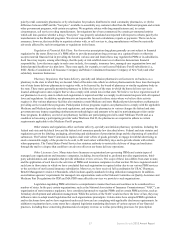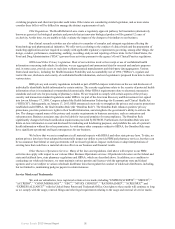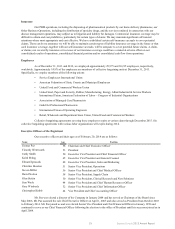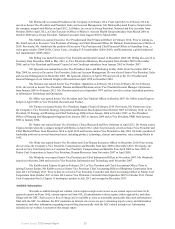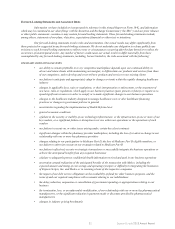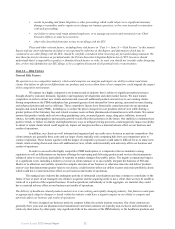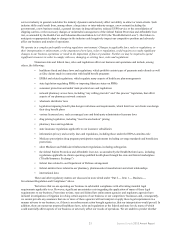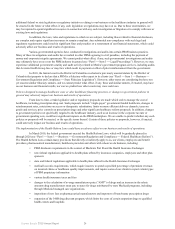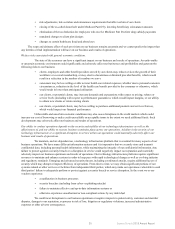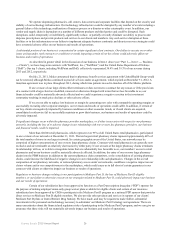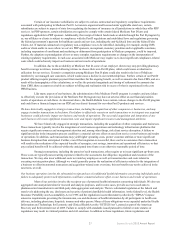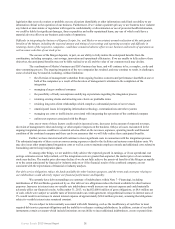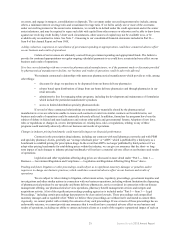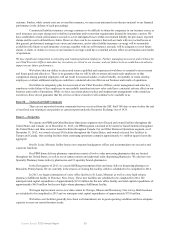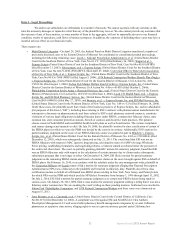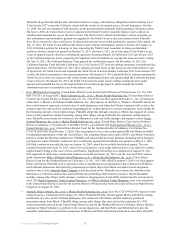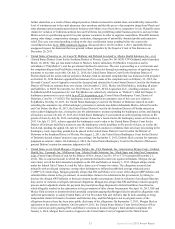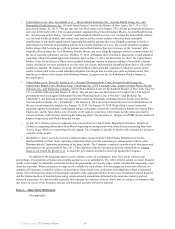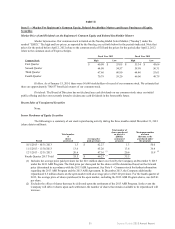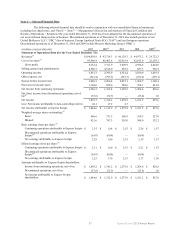Express Scripts 2013 Annual Report Download - page 27
Download and view the complete annual report
Please find page 27 of the 2013 Express Scripts annual report below. You can navigate through the pages in the report by either clicking on the pages listed below, or by using the keyword search tool below to find specific information within the annual report.
27 Express Scripts 2013 Annual Report
Certain of our insurance subsidiaries are subject to various contractual and regulatory compliance requirements
associated with participating in Medicare Part D. As insurers organized and licensed under applicable state laws, certain
subsidiaries are subject to aspects of state laws regulating the business of insurance in all jurisdictions in which they offer PDP
services. As PDP sponsors, certain subsidiaries are required to comply with certain federal Medicare Part D laws and
regulations applicable to PDP sponsors. Additionally, the receipt of federal funds made available through the Part D program by
us, our affiliates or clients is subject to compliance with the Part D regulations and established laws and regulations governing
the federal government’s payment for healthcare goods and services, including the anti-kickback laws and the federal False
Claims Act. If material contractual or regulatory non-compliance was to be identified, including, for example, during CMS
audits or client audits in cases where we service PDP sponsors, recoupment, monetary penalties and/or applicable sanctions,
including suspension of enrollment and marketing or debarment from participation in Medicare programs, could be imposed.
Further, the adoption or promulgation of new or more complex regulatory requirements or changes in the interpretation of
existing regulatory requirements, in each case, associated with Medicare may require us to incur significant compliance-related
costs which could adversely impact our business and our results of operations.
In addition, due to the availability of Medicare Part D, some of our employer clients may stop providing pharmacy
benefit coverage to retirees, instead allowing retirees to choose their own Part D plans, which could cause a reduction in
utilization for our services. Extensive competition among Medicare Part D plans could also result in the loss of Medicare
members by our managed care customers, which would cause a decline in our membership base. Further, certain of our Part D
product offerings require premium payment from members for the ongoing benefit, as well as amounts due from CMS, and as a
result of the demographics of the calculations, as well as the potential magnitude and timing of settlement for amounts due
from CMS, these accounts receivable are subject to billing and realization risk in excess of what is experienced in the core
PBM business.
Like many aspects of our business, the administration of the Medicare Part D program is complex and any failure
to effectively execute the provisions of the Medicare Part D program may have an adverse effect on our financial position
results of operations or cash flows. As discussed above, the Health Reform Laws contain various changes to the Part D program
and could have a financial impact on our PDP and our clients’ demand for our other Part D products and services.
We have historically engaged in strategic transactions, including the acquisition of other companies or businesses, and may
engage in similar transactions in the future. Our failure to effectively execute on such transactions or to integrate any acquired
businesses could adversely impact our business and results of operations. The successful acquisition and integration of any
such business will create significant transaction costs and require significant resources and management attention.
We have historically engaged in strategic transactions, including the acquisition of other companies and businesses.
These transactions typically involve the integration of core business operations and technology infrastructure platforms that
require significant resources and management attention and, among other things, risk client service disruption. A failure or
significant delay in the integration process could have a material adverse effect on our client service or our business and results
of operations. In addition, such transactions may yield higher operating costs, greater customer attrition or more significant
business disruption than anticipated. Further, even if the integration is successful, there can be no assurance that a transaction
will result in the realization of the expected benefits of synergies, cost savings, innovation and operational efficiencies, or that
any realized benefits will be achieved within the anticipated time frame or an otherwise reasonable period of time.
Strategic transactions, including the pursuit of such transactions, often require us to incur significant up-front costs.
These costs are typically non-recurring expenses related to the assessment, due diligence, negotiation and execution of the
transaction. We may also incur additional costs to retain key employees as well as transaction fees and costs related to
executing our integration plans. Although we would generally pursue the realization of efficiencies related to the integration of
a business to offset incremental transaction and acquisition-related costs over time, this net benefit may not be achieved in the
near term, or at all.
Our business operations involve the substantial receipt and use of confidential health information concerning individuals and a
failure to adequately protect such information could have a material adverse effect on our business and results of operations.
Most of our activities involve the receipt or use of protected health information concerning individuals. We also use
aggregated and anonymized data for research and analysis purposes, and in some cases, provide access to such data to
pharmaceutical manufacturers and third-party data aggregators and analysts. There is substantial regulation at the federal and
state levels addressing the use, disclosure and security of patient identifiable health information. At the federal level, the Health
Insurance Portability and Accountability Act of 1996 and the regulations issued thereunder (collectively “HIPAA”) impose
extensive requirements governing the transmission, use and disclosure of health information by all participants in health care
delivery, including physicians, hospitals, insurers and other payors. Many of these obligations were expanded under the Health
Information and Technology for Economic and Clinical Health Act (the “HITECH Act”), passed as part of the American
Recovery and Reinvestment Act of 2009. Failure to comply with standards issued pursuant to federal or state statutes or
regulations may result in criminal penalties and civil sanctions. In addition to these regulations, future regulations and


